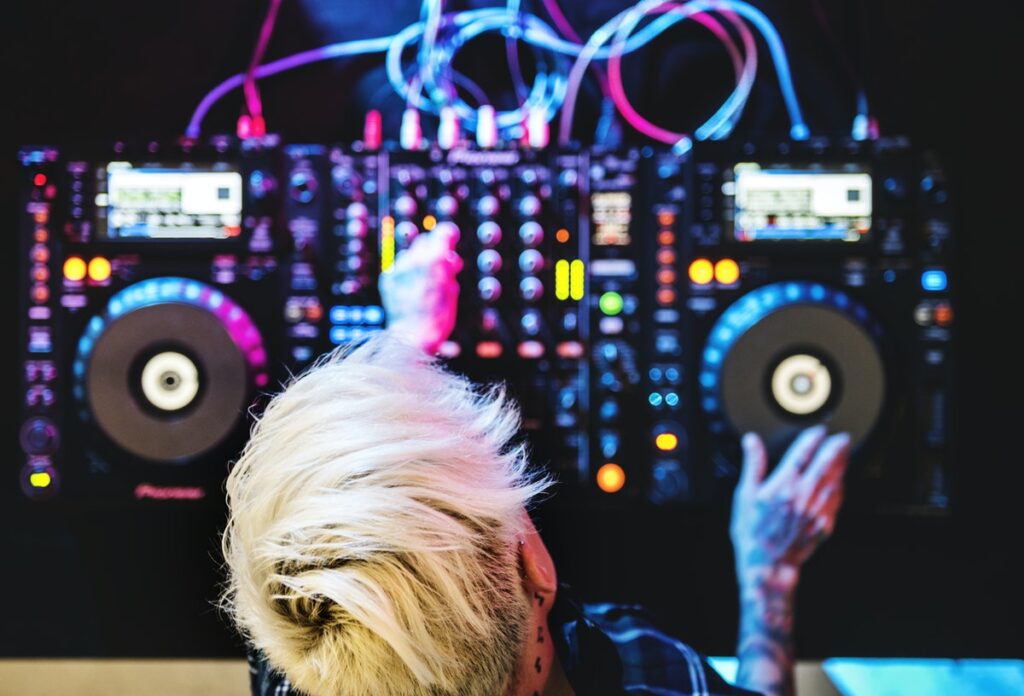
If you’re passionate about music and entertainment, then becoming a professional DJ might be the perfect career choice for you. In this job, you can combine your love of performing with music production and perhaps even get to see the world in the process.
However, many aspiring DJs don’t know where to begin when it comes to establishing themselves as a professional. After all, this career path isn’t as reliable or clean-cut as many others; it’s cutthroat and competitive, make no mistake, and only the most determined succeed. That said, with a little luck, loads of drive and of course some talent, it could be a career for you. With that in mind, here’s our IDEAL beginner’s guide to becoming a professional DJ.
WHAT DO YOU NEED?
You can’t become a professional DJ without a proper DJ setup. But what exactly do you need? Well, for starters, you should have two decks for playing music. These can be either vinyl turntables for vinyl records or CDJ turntables for disc tracks.
Secondly, you will need a DJ mixer. This is what you will use to seamlessly transition from track to track whilst you’re performing. Thirdly, monitoring speakers are essential. You use these to hear what signal is being emitted by the music you’re playing. Monitoring speakers with an amplifier also boost the volume from your sound source. Finally, you should invest in some headphones. DJs use these to cue up a song whilst the other is currently playing to the audience. If you need more information on DJ setups, follow the steps in this article.
HOW WILL YOU SPECIALISE?
Well, this depends. There are different types of DJs for different events and purposes; it’s not going to all be Guetta style superstar shows in Vegas, let’s be honest. And so, let’s break these down into digestible pieces for you.
- Club DJ
The purpose of club DJs is to ensure everyone on the dance floor keeps moving. They often do this by using transitions, which are basically long blends between songs. What’s more, club DJs must be aware of the demographic in the establishment they’re performing in. Every night club has a different reputation and feel – your job is to make sure the music is right for the people it will attract.

- Mobile DJ
A mobile DJ is like a freelance writer. They will take a variety of jobs from a variety of clients for different events. For example, mobile DJs might be hired for weddings or corporate events. If you want to be a successful mobile DJ, then you need to make sure your music matches the tone of the occasion. You’ll also be in charge of setting up equipment, making announcements, managing the crowd, and taking requests. This is a completely different skill set to a club DJ.
- Radio DJ
As you might have guessed already, radio DJs perform their tracks for audiences on the radio. This job role is quite varied. You might announce the weather forecast and news updates, for instance, alongside playing music to suit the mood of the day or the radio station in question.
- Performance DJs
Performance DJs are especially talented at mixing behind the decks, and have a vast range of knowledge regarding professional music production techniques. They can execute impressive tricks and transitions, such as cutting or scratching. Performance DJs are masters of the craft, attracting audiences because of their reputation. Their setup is basically their musical instrument.

HOW DO YOU GET WORK?
If you’re seriously considering becoming a DJ as a professional career, then you’re probably wondering how to go about getting work. Unfortunately, this isn’t very easy – particularly when you’re first starting out because you don’t have any credentials or contacts. So, here are some tips which will help you get your name out there and secure work.
- Build an Online Presence
Every professional DJ needs to create an online profile that potential clients can contact them through. When doing so, make sure that you effectively communicate your brand, too. Explicitly state what kind of DJ you are. List what services you provide. Highlight the benefits of your business. You should also give samples to your clients – such as videos of you performing, audio of songs you have mixed, etc.
- Become Active on Social Media
If you want to become a successful DJ in the modern era, then you really need to create your own social media accounts. The most popular include Facebook, Instagram, Twitter and SoundCloud. You can also link to these pages on your professional website.
To guarantee your social media promotion is effective, you need to be consistent when producing content. This will keep your brand in other people’s minds, so they’ll think of you when they next need to hire a DJ. You should also be producing new content for your social media accounts. This could include behind-the-scenes photos of you setting things up, or a sample of the latest track you have just mixed.
Finally, try supporting other artists on these platforms. Forming a symbiotic relationship will help both of your businesses.
We hope you have found our beginner’s guide to becoming a professional DJ helpful.





